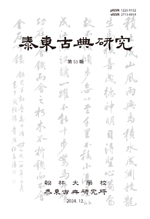미래공동체 담론으로서 조소앙의 삼균주의 탐색 - ‘민주공화’와 ‘균등’을 중심으로
Exploring Jo So-ang’s Doctrine of “Three Equalities” as a Discourse on the Future Community: Focusing on “Democratic Republic” and “Equality”
- 한림대학교 태동고전연구소
- 태동고전연구
- 제53집
-
2024.12155 - 186 (32 pages)
-
DOI : 10.31408/tdicr.2024.53.155
- 22

이 글은 ‘민주공화’와 ‘균등’을 중심으로 미래공동체 담론의 원천으로서 조소앙의 삼균주의를 살핀다. 이를 위해 먼저 전문(前文)과 제1조를 중심으로 대한민국 제헌헌법을 검토하여, 대한민국 헌법 특징으로 제시된 ‘균등’과 국가 공동체의 체제로서 ‘민주공화’의 의미를 살핀다. 다음으로 1910년대에서 1940년대까지 조소앙의 ‘민주공화’에 대한 해석을 살피고, 조소앙의삼균주의에서 개인과 공동체의 관계와 그 관계 속에서 ‘균등’이 지닌 의미를 검토한다. 이를 바탕으로 미래공동체 담론의 하나로서 삼균주의의 가능성을 논한다. 제헌헌법 전문에서는 개인의 자유와 평등을 중시하면서도 사회·경제적 민주주의를 통한균등사회의 수립을 강조한다. 제1조에서는 대한민국을 ‘민주공화국’으로 정의하는데, 이는 권력분립의 정치체제로서 ‘민주제’와 군주가 아닌 국민에 의해 통치되는 국가체제로서 ‘공화국’ 두 개념이 합해진 용어다. 이러한 민주공화 체제와 균등의 강조는 조소앙의 삼균주의로부터 말미암는다. 임시정부 임시헌장(1919) 초안 기초 시에 조소앙에게 ‘민주공화제’는 단순히 전제군주제의 반대 체제의 의미였지만, 민주주의에 대한 이해가 깊어지고 삼균주의가 정립된 이후 ‘민주공화’는 전 인민들의 균등한 정치참여로 이루어지는 ‘균등’에 기초한 체제로서 의미를 지닌다. 조소앙이 ‘균등’을 삼균주의의 핵심 사상으로 삼은 까닭은 개인·민족·국가 등에서불균등과 불평등으로 일어나는 전쟁을 막고 인류의 평화와 행복을 이루기 위함이다. 그에게‘균등’은 개인과 공동체의 관계에서 평화로운 공존을 실현하는 필수 요소로서 가치를 지닌다. 결론적으로 균등에 기초한 ‘민주공화’ 체제를 논하고, 개인과 공동체의 공존을 위한 핵심가치로서 ‘균등’을 논한 조소앙의 삼균주의는 대한민국의 미래공동체 담론의 하나로서 충분한가치를 지닌다고 할 수 있다.
This paper examines Jo So-ang’s doctrine of “Three Equalities” (samgyunjuui) as a foundational source for future community discourse, focusing on the concepts of a “democratic republic” and “equality.” To this end, the study first reviews the Preamble and Article 1 of the First Constitution of the Republic of Korea, analyzing “equality” as a defining feature of the Korean Constitution and the idea of a “democratic republic” as the framework of the national community. Next, the study examines Jo So-ang’s interpretation of a “democratic republic” from the 1910s to the 1940s. It then reviews the relationship between the individual and the community within Jo So-ang’s doctrine of “Three Equalities” and further examines the significance of “equality” within the context of this relationship. Based on these analyses, the potential of the doctrine of “Three Equalities” as a discourse on the future community is discussed. In the Preamble of the First Constitution, emphasis is placed on both individual freedom and equality while advocating for the establishment of an equitable society through social and economic democracy. Article 1 defines the Republic of Korea as a “democratic republic,” a term that combines two concepts: “democracy” as a political system based on the separation of powers, and “republic” as a state governed by the people rather than a monarch. This emphasis on the democratic republic system and equality originates from Jo So-ang’s doctrine of “Three Equalities.” During the drafting of the Provisional Charter (1919) by the Provisional Government, Jo So-ang initially understood the “democratic republic” as merely the opposite of an absolute monarchy. However, as his understanding of democracy deepened and the doctrine of “Three Equalities” was established, “democratic republic” came to signify a system grounded in “equality” achieved through the equal political participation of all people. Jo So-ang regarded “equality” as the core of his doctrine of “Three Equalities” to prevent wars caused by disparities and inequalities among individuals, nations, and states, and to achieve peace and happiness for humanity. For him, “equality” held intrinsic value as an essential element for realizing peaceful coexistence between the individual and the community. In conclusion, Jo So-ang’s doctrine of “Three Equalities,” which advocates a “democratic republic” based on equality and emphasizes “equality” as a core value for the coexistence of individuals and the community, holds significant value as a discourse on the future community of the Republic of Korea.
1. 머리말
2. 제헌헌법과 삼균주의
3. 균등에 기초한 ‘민주공화’
4. 개인과 공동체의 공존을 위한 ‘균등’
5. 맺음말
(0)
(0)